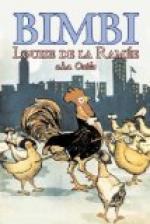When he had eaten, not as much as he wanted, but as much as he thought was prudent (for who could say when he would be able to buy anything more?), he set to work like a little mouse to make a hole in the withes of straw and hay which enveloped the stove. If it had been put in a packing-case, he would have been defeated at the onset. As it was, he gnawed, and nibbled, and pulled, and pushed, just as a mouse would have done, making his hole where he guessed that the opening of the stove was—the opening through which he had so often thrust the big oak logs to feed it. No one disturbed him; the heavy train went lumbering on and on, and he saw nothing at all of the beautiful mountains, and shining waters, and great forests through which he was being carried. He was hard at work getting through the straw and hay and twisted ropes; and get through them at last he did, and found the door of the stove, which he knew so well, and which was quite large enough for a child of his age to slip through, and it was this which he had counted upon doing. Slip through he did, as he had often done at home for fun, and curled himself up there to see if he could anyhow remain during many hours. He found that he could; air came in through the brass fretwork of the stove; and with admirable caution in such a little fellow he leaned out, drew the hay and straw together, and rearranged the ropes, so that no one could ever have dreamed a little mouse had been at them. Then he curled himself up again, this time more like a dormouse than anything else; and, being safe inside his dear Hirschvogel and intensely cold, he went fast asleep, as if he were in his own bed at home with Albrecht and Christof on either side of him. The train lumbered on, stopping often and long, as the habit of goods trains is, sweeping the snow away with its cow-switcher, and rumbling through the deep heart of the mountains, with its lamps aglow like the eyes of a dog in a night of frost.
The train rolled on in its heavy, slow fashion, and the child slept soundly for a long while. When he did awake, it was quite dark outside in the land; he could not see, and of course he was in absolute darkness; and for a while he was sorely frightened, and trembled terribly, and sobbed in a quiet, heartbroken fashion, thinking of them all at home. Poor Dorothea! how anxious she would be! How she would run over the town and walk up to grandfather’s at Dorf Ampas, and perhaps even send over to Jenbach, thinking he had taken refuge with Uncle Joachim! His conscience smote him for the sorrow he must be even then causing to his gentle sister; but it never occurred to him to try and go back. If he once were to lose sight of Hirschvogel, how could he ever hope to find it again? how could he ever know whither it had gone—north, south, east, or west? The old neighbor had said that the world was small; but August knew at least that it must have a great many places in it: that he had seen himself on the maps on his schoolhouse walls. Almost any other little boy would, I think, have been frightened out of his wits at the position in which he found himself; but August was brave, and he had a firm belief that God and Hirschvogel would take care of him. The master-potter of Nurnberg was always present to his mind, a kindly, benign, and gracious spirit, dwelling manifestly in that porcelain tower whereof he had been the maker.




